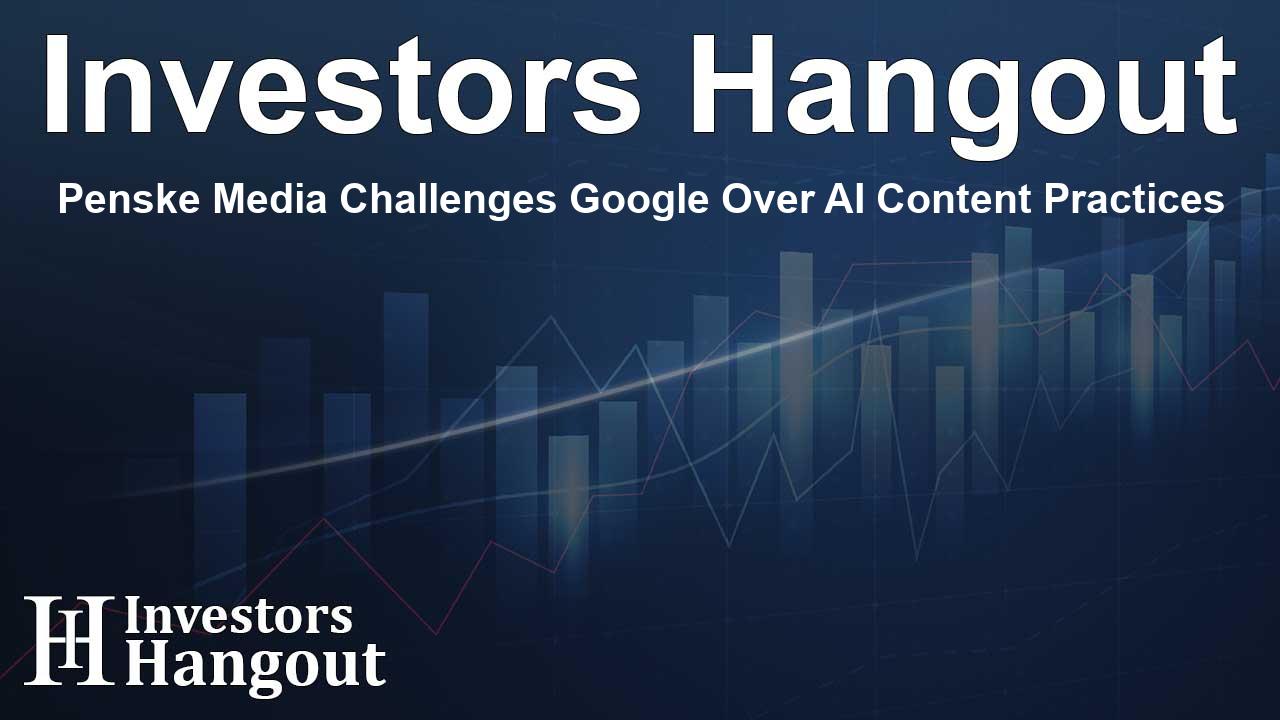Penske Media Challenges Google Over AI Content Practices

Penske Media Files Lawsuit Against Google
Penske Media, the parent company of renowned publications such as Rolling Stone and Billboard, has taken a significant legal step by suing Alphabet Inc.'s Google. The lawsuit centers around Google's use of AI-generated summaries that allegedly leverage Penske's original journalism without authorization.
Impact of AI Overviews on Revenue
According to Penske Media, the AI Overviews implemented by Google have been detrimental, reducing traffic to their websites and, consequently, their revenue. This lawsuit marks a key moment as it represents the first major legal push by a U.S. publisher against Google relating to these AI summaries. The claims suggest that Google mimics journalistic work under the premise of user convenience, while undermining the financial health of content creators.
Google's Dominance in the Search Market
In the lawsuit, Penske Media highlights Google's near-monopolistic hold on the search market, which reportedly hovers around 90%. This dominance allows Google to enforce terms that may not be favorable to publishers. Penske has reportedly observed that about 20% of Google searches leading to their sites incorporate AI Overviews—a figure that seems poised to rise, threatening significant drops in affiliate revenue.
Responses from Google and Industry Concerns
Google's response, articulated by spokesman Jose Castaneda, emphasized that AI Overviews are designed to enhance user experience while also increasing opportunities for content discovery. However, representatives from the News/Media Alliance have voiced apprehensions regarding Google's market influence and the ramifications it may have on licensing agreements for AI technologies.
A Wider Trend in Legal Actions Against Google
The legal action taken by Penske Media isn't an isolated case. Earlier this year, Chegg Inc., a prominent education technology company, also initiated legal proceedings against Google for similar reasons, arguing that AI-generated overviews of its content are detrimental to web traffic and the future landscape of online publishing.
This growing trend showcases an escalating concern among publishers regarding the integration of AI technologies and their potential to disrupt established business models.
Additional Media Lawsuits on the Horizon
In another notable scenario, Japanese media entities Nikkei and Asahi Shimbun also pursued legal action against another AI service, Perplexity AI, citing unlawful storage and misuse of original articles. These developments signify a broader debate around content ownership and rights in the age of artificial intelligence.
Conclusion
Penske Media's lawsuit emphasizes a crucial battle between publishers and tech giants over content autonomy and economic survival. As technological capabilities expand, the dialogue between content creators and platforms like Google will likely continue to evolve, potentially leading to more legal disputes designed to protect journalistic integrity and revenue streams. The resolution of these cases may set important precedents for the future of media and technology collaborations.
Frequently Asked Questions
What is the basis of Penske Media's lawsuit against Google?
The lawsuit centers on Google's use of AI-generated summaries that allegedly exploit Penske's journalism without permission, leading to decreased web traffic and revenue.
How does Google justify its AI Overviews feature?
Google claims that the AI Overviews improve user experience and enhance content discovery opportunities for users searching online.
What do industry experts say about Google's market power?
Experts from the News/Media Alliance have expressed concern about Google's significant influence in the market and its impact on licensing agreements regarding AI usage.
Have other companies taken similar legal action against Google?
Yes, Chegg Inc. has also sued Google for its AI-generated content, highlighting growing apprehensions among publishers about AI's effect on their business models.
What might be the implications of these legal actions?
The outcomes of these lawsuits could set important precedents regarding content ownership and the rights of publishers in the digital landscape.
About The Author
Contact Evelyn Baker privately here. Or send an email with ATTN: Evelyn Baker as the subject to contact@investorshangout.com.
About Investors Hangout
Investors Hangout is a leading online stock forum for financial discussion and learning, offering a wide range of free tools and resources. It draws in traders of all levels, who exchange market knowledge, investigate trading tactics, and keep an eye on industry developments in real time. Featuring financial articles, stock message boards, quotes, charts, company profiles, and live news updates. Through cooperative learning and a wealth of informational resources, it helps users from novices creating their first portfolios to experts honing their techniques. Join Investors Hangout today: https://investorshangout.com/
The content of this article is based on factual, publicly available information and does not represent legal, financial, or investment advice. Investors Hangout does not offer financial advice, and the author is not a licensed financial advisor. Consult a qualified advisor before making any financial or investment decisions based on this article. This article should not be considered advice to purchase, sell, or hold any securities or other investments. If any of the material provided here is inaccurate, please contact us for corrections.
